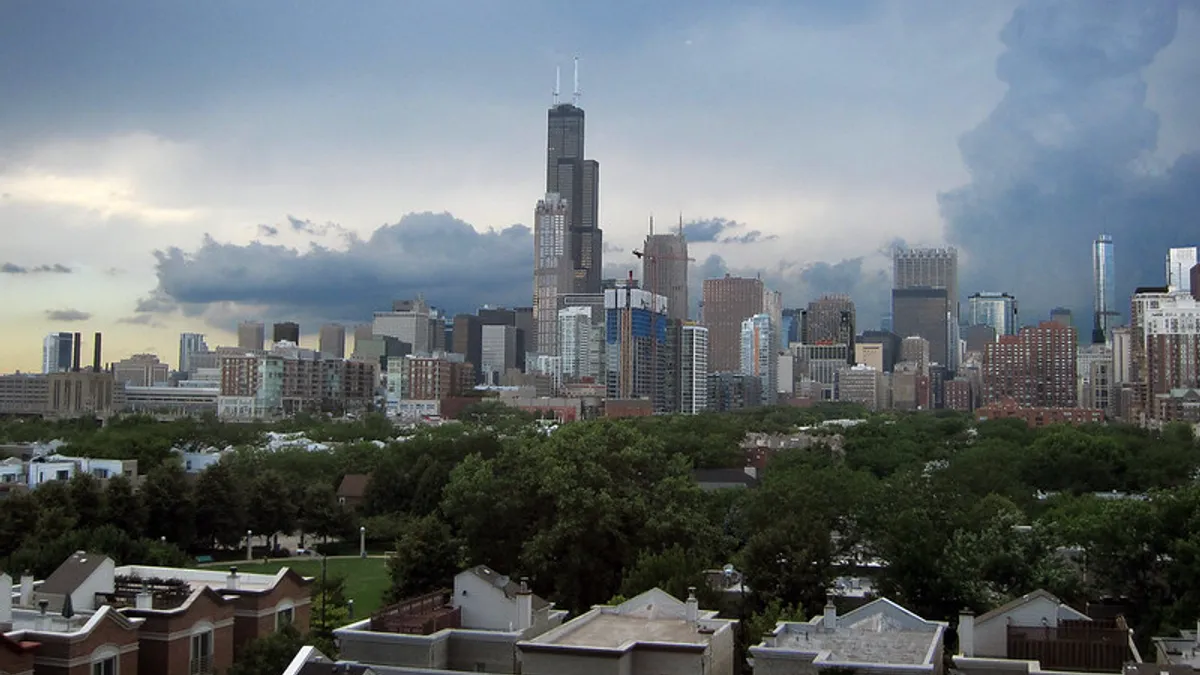UPDATE: Nov. 24, 2020: Chicago's city council approved a temporary 15% delivery fee cap Monday on what third-party aggregators can charge restaurants. The limit took immediate effect, and delivery platforms that violate the new standard will be fined between $1,000 and $2,000 per offense, CBS Chicago reports. The cap will remain in place until indoor dining is allowed at 40% capacity or more for at least 60 days.
The ordinance also bars delivery platforms from charging higher prices for menu items than what is set by restaurants. It also requires aggregators to allow diners to send tips directly to restaurants, and will not allow delivery companies to reduce driver pay or touch their tips in response to the cap.
Dive Brief:
- Chicago Mayor Lori Lightfoot announced a new grant program Thursday that would offer $10,000 to independent restaurants that have been forced to close their dine-in operations, The Chicago Sun Times reports. The program comes on the heels of Governor J.B. Pritzker’s suspension of indoor dining and bar service following an increase in COVID-19 positivity rates.
- The grants will go to 1,000 struggling restaurants and bars chosen in a lottery administered by World Business Chicago, according to the Sun Times. Restaurants must prove that they have lost at least 25% of annual net revenues under $3 million since March 1. Restaurants with more than two locations are not eligible.
- The city is also seeking a temporary cap on restaurant delivery service fees. Chicago introduced a 5% fee cap in May, but it never made it out of committee. If it had passed, the 5% cap would have be the most restrictive in the country, according to Eater Chicago. San Francisco’s cap is at 15%, while New York’s is at 20%.
Dive Insight:
Restaurants that receive Chicago's grant must use the money for payroll, inventory, rent or utility bills. No doubt $10,000 could provide a significant lifeline for independent restaurants.
And for independent restaurants operating on razor-thin margins, capping third-party delivery fees is also a big deal, particularly as restaurants will need to rely more heavily on delivery services during the winter when outdoor dining is less feasible. However, delivery companies are pushing back against Chicago’s proposal. DoorDash argued the cap would reduce customer service and hurt delivery employee wages, while Uber Eats added the cap would push the costs back to small, local restaurants.
The grant program and delivery cap proposal are two of a number of initiatives Chicago has in place to help its bustling restaurant community. Lightfoot also launched a "Take Out Chicago" content to incentivize customers to order from at least 10 restaurants through Dec. 15 in order to receive VIP tours of the city’s cultural institutions. City Hall also developed a "Chi Serves" job resource and training portal for hospitality workers who have lost their jobs during the pandemic. And in October, the city introduced "Dine Together, Apart," which added enclosed dining pods to restaurants in the Fulton Market District. In August, Chicago also launched a Winter Design Challenge to solicit ideas that would allow outdoor dining to continue at restaurants through the winter.
The city is also getting some help from the state. Illinois is providing $220 million in business interruption grants to small businesses impacted by the pandemic. The Illinois Restaurant Association has also collaborated with DoorDash to offer $500,000 in grants to help Chicago restaurants winterize their outdoor dining spaces.
This winter will prove just how much all of these initiatives help during another round of shutdowns. Chicago is among the first cities to reclose dining rooms due to growing concerns about a second wave of coronavirus. In a statement, the Illinois Restaurant Association applauded Mayor Lightfoot’s grant and delivery cap announcement, noting, "Every bit of financial and regulatory support helps during this critical time." The IRA also continues to call on Governor Pritzker to loosen regulations on indoor dining. So far, about 110 Chicago restaurants have permanently closed due to the coronavirus pandemic, The Infatuation reports.
Correction: In a previous version of this article, the threshold for Chicago's proposed delivery fee cap was incorrect. The city has not disclosed a percentage to cap commission fees. In May, Chicago pursued a 5% cap that did not come to fruition.













